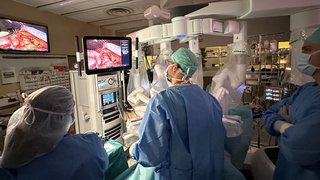Experienced in Extraordinary Care
UT Southwestern has established one of the largest and most comprehensive pancreatic cancer prevention programs in the United States. Our specialists provide highly advanced care built on groundbreaking science to evaluate, monitor, and treat pancreatic diseases.
Gastroenterologists, radiologists, surgical oncologists, advanced practice providers, genetic counselors, and a care coordinator are all part of our Pancreatic Cancer Prevention Program. They work together as a team to determine the most appropriate care plans for every patient we see.
We're also committed to providing clear information about each patient's diagnosis and care plan and answering their questions. Communicating is one of the ways we work to help patients feel empowered and engaged with their health.
Prompt Evaluation and Answers
Initial appointments are scheduled as quickly as possible with our Pancreatic Cancer Prevention Program care team.
Please keep in mind that a patient is already under our care before their first in-person appointment. We begin reviewing their medical information immediately after receiving the referral. This helps us prepare a highly personalized, comprehensive plan of care during their first visit to our clinic.
To help plan for that first visit to our clinic and to find out what information we’ll need, please read What to Expect.












